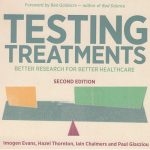
Linguistic strategies for improving informed consent in clinical trials among low health literacy patients
Evidence-based guidance on how to improve informed consent processes for patients being invited to participate in clinical research.
| 0 Comments | Evaluated
Informed Health Choices Podcasts
Each episode includes a short story with an example of a treatment claim and a simple explanation of a Key Concept used to assess that claim
| 1 Comment | Evaluated
Informed Health Choices Primary School Resources
A textbook and a teachers’ guide for 10 to 12-year-olds. The textbook includes a comic, exercises and classroom activities.
| 0 Comments | Evaluated
Ebm@school – a curriculum of critical health literacy for secondary school students
A curriculum based on the concept of evidence-based medicine, which consists of six modules.
| 0 Comments | Evaluated
Know Your Chances
This book has been shown in two randomized trials to improve peoples' understanding of risk in the context of health care choices.
| 0 Comments | Evaluated
Sunn Skepsis
Denne portalen er ment å gi deg som pasient råd om kvalitetskriterier for helseinformasjon og tilgang til forskningsbasert informasjon.
| 0 Comments
‘Tricks to help you get the result you want from your study (S4BE)
Inspired by a chapter in Ben Goldacre’s ‘Bad Science’, medical student Sam Marks shows you how to fiddle research results.
| 0 Comments

Teach Yourself Cochrane
Tells the story behind Cochrane and the challenges finding good quality evidence to produce reliable systematic reviews.
| 3 Comments
Building evidence into education
Ben Goldacre explains why appropriate infrastructure is need to do clinical trials of sufficient rigour and size to yield reliable results.
| 0 Comments
Critical appraisal
University of New South Wales Medical Statistics Tutorial 4 addresses Critical Appraisal.
| 0 Comments
Bias – the biggest enemy
University of New South Wales Medical Stats Online Tutorial 5 addresses ‘Bias - the biggest enemy’.
| 0 Comments
Generation R – Pictionary research activity
GenerationR’s version of Pictionary using research concepts instead of usual game cards, allocated in different levels of difficulty.
| 0 Comments
Generation R – Clinical trials card-sorting exercise
Card-sorting exercise developed by GenerationR to familiarise children and young people with jargon terms used by clinical researchers.
| 0 Comments
Basic principles of randomised trials, and validity
A 8-min talk on ‘Basic principles of Randomised Trials, and Validity’, illustrated by 15 slides, with notes.
| 0 Comments
Appraising the evidence
Six key slides produced by the University of Western Australia to introduce critical appraisal.
| 0 Comments
Detectives in the classroom
Five modules of materials for promoting epidemiology among high school students.
| 0 Comments
Not all scientific studies are created equally
David Schwartz dissects two types of studies that scientists use, illuminating why you should always approach claims with a critical eye.
| 1 Comment
10 Components of effective clinical epidemiology: How to get started
PDF & Podcast of 1-hr talk by Carl Heneghan (Centre for Evidence-Based Medicine, Oxford) on effective clinical epidemiology.
| 0 Comments
Critical appraisal of clinical trials
Slides developed by Amanda Burls for an interactive presentation covering the most important features of well controlled trials.
| 0 Comments
Explaining the unbiased creation of treatment comparison groups and blinded outcome assessment
A class were given coloured sweets and asked to design an experiment to find out whether red sweets helped children to think more quickly.
| 0 Comments
How Science Works
Definitions of terms that students have to know for 'How Science Works' and associated coursework, ISAs, etc
| 0 Comments
Making sense of randomized trials
A description of how clinical trials are constructed and analysed to ensure they provide fair comparisons of treatments.
| 0 Comments
Randomized Control Trials
1/2, 40-min lecture on randomized trials by Dr R Ramakrishnan (Lecture 25) for the Central Coordinated Bioethics Programme in India.
| 0 Comments
Randomised Control Trials – CASP
This module looks at the critical appraisal of randomised trials.
| 0 Comments

The need to compare like-with-like in treatment comparisons
Allocation bias results when trials fail to ensure that, apart from the treatments being compared, ‘like will be compared with like'.
| 0 Comments
The need to avoid differences in the way treatment outcomes are assessed
Biased treatment outcome assessment can result if people know which participants have received which treatments.
| 0 Comments
Interactive PowerPoint Presentation about Clinical Trials
An interactive Powerpoint presentation for people thinking about participating in a clinical trial or interested in learning about them.
| 0 Comments
Suzie in despair
Apart from the treatments being compared, the comparison groups need to be similar.
| 0 Comments

Introduction to clinical trials: lay-friendly video
This lay-friendly video introduction to clinical trials was created by the European Communication on Research Awareness Needs Project.
| 3 Comments
A simple fair testing plan for science lessons
A short worksheet to help students devise a Fair Test.
| 0 Comments
Worksheet for planning fair tests
A TES worksheet to guide primary school children in planning a Fair Test.
| 0 Comments
How are medicinal drugs tested?
A group of text files for teaching students about how medicinal drugs are tested.
| 0 Comments
Designing a fair test
Using an everyday example to try to help students realise what fair testing involves.
| 0 Comments
CEBM – Study Designs
A short article explaining the relative strengths and weaknesses of different types of study design for assessing treatment effects.
| 0 Comments
Introduction to Critical Appraisal
30-slide introduction by Jason Curtis, to Critical Appraisal.
| 0 Comments
Randomized Controlled Trial Protocols
A 1-hour videoed lecture explaining protocols for Randomized Control Trials (RCTs).
| 0 Comments
Randomised Controlled Trials vs. Observational Studies
5-minute video explaining the difference between randomised trials and observational studies.
| 0 Comments
How do you know which healthcare research you can trust?
A detailed guide to study design, with learning objectives, explaining some sources of bias in health studies.
| 0 Comments
Smart Health Choices: making sense of health advice
The Smart Health Choices e-book explains how to make informed health decisions.
| 0 Comments
Methodology of clinical trials
Eurordis training on the methodology of clinical trials for representatives of patients’ organisations.
| 0 Comments
The Fair Test (controlling variables)
TES PowerPoint presentation of 9 slides about the importance of controlling variables (i.e. conducting a fair test).
| 0 Comments
Investigation: Designing a fair test
A teaching tool for teachers to illustrate how to carry out fair tests.
| 0 Comments
The basic principles of Evidence Based Medicine
A webpage explaining the foundations of systematic reviews.
| 0 Comments
Mega-trials
In this 5 min audio resource, Neeraj Bhala discusses systematic reviews and the impact of mega-trials.
| 0 Comments
The Gold Standard: What are randomised control trials and why are they important?
A four minute video by the MRC Clinical Trials Unit about the importance of randomised control trials.
| 0 Comments
Lesson plan for teaching secondary school students about double-blind trials
This lesson plan provides resources to run stimulating activities about fair tests of treatments in a classroom setting.
| 0 Comments
Viva la Evidence!
A brilliant song and video by James McCormack explaining the basics of evidence-based medicine.
| 0 Comments
Psoriasis patients poorly served by research
‘Few trials involved comparison of different options or looked at long-term management. The duration of studies is unconvincingly brief in […]
| 0 Comments
Psychiatric disorders
Regrettably, research is not always well done or relevant. Take the example of a distressing condition known as tardive dyskinesia. […]
| 0 Comments
In an ideal world
‘In an ideal world, wherever possible, we could be gathering anonymised outcome data and comparing this against medication history, making […]
| 0 Comments
Generating and investigating hunches about unanticipated adverse effects of treatments
Generating hunches about unanticipated effects of treatments Unanticipated effects of treatments, whether bad or good, are often first suspected by […]
| 2 Comments
Ways of using unbiased (random) allocation in treatment comparisons
Random allocation for treatment comparisons can be used in various ways. For example, it can be used to compare different […]
| 0 Comments
Unbiased, prospective allocation to different treatments
In 1854, Thomas Graham Balfour, an army doctor in charge of a military orphanage, showed how treatment groups could be […]
| 0 Comments
Comparing apparently similar groups of patients who happen to have received different treatments in the same time period
Comparing the experiences and outcomes of apparently similar groups of patients who happen to have received different treatments in the […]
| 0 Comments
Comparing patients given treatments today with apparently similar patients given other treatments in the past for the same disease
Researchers sometimes compare patients given treatments today with apparently similar patients given other treatments in the past for the same […]
| 0 Comments
Treatments with moderate but important effects
This section addresses the common situation in which treatments may differ only moderately from each other, but these differences may […]
| 0 Comments
Comparing like with like
In this sub-section Comparisons are key (this page) Treatments with dramatic effects Treatments with moderate but important effects Comparisons are […]
| 2 Comments
Fair tests of treatments
Key points Fair tests of are needed because we will otherwise sometimes conclude that treatments are useful when they are […]
| 2 Comments
Providing treatment as part of a fair test
So what should happen when there is important about the effects of new or old treatments that have not been […]
| 0 Comments
Random allocation – a simple explanation
‘Randomisation is to minimise bias and ensure that the patients in each treatment group are as similar as possible in […]
| 0 CommentsNo Resources Found
Try clearing your filters or selecting different ones.
Browse by Key Concept
Back to Learning Resources homeJargon buster
About GET-IT
GET-IT provides plain language definitions of health research terms
